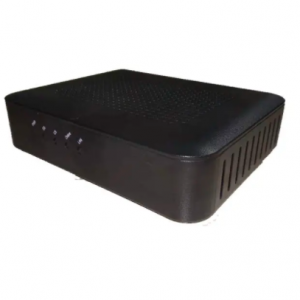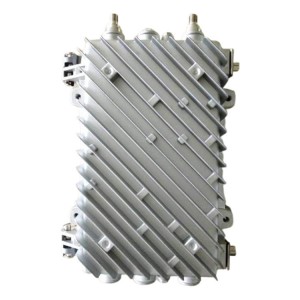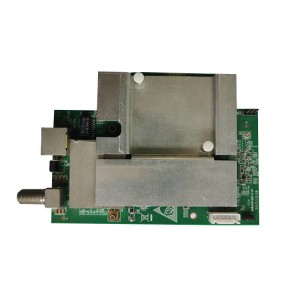ECMM, DOCSIS 3.1, 2xGE, MMCX, DV410IE
Short Description:
The MoreLink’s DV410IE is a DOCSIS 3.1 ECMM Module (Embedded Cable Modem Module) supporting 2×2 OFDM and 32×8 SC-QAM to deliver a powerful high-speed Internet experience. Temperature hardened design which is suitable for industrial applications.
Product Detail
Product Tags
Product Detail
The MoreLink’s DV410IE is a DOCSIS 3.1 ECMM Module (Embedded Cable Modem Module) supporting 2x2 OFDM and 32x8 SC-QAM to deliver a powerful high-speed Internet experience. Temperature hardened design which is suitable for industrial applications.
The MK440IE-P is the perfect choice for cable operators who want to offer high-speed and economic broadband access to their customer base. It delivers speeds up to 2Gbps based on 2 Giga Ethernet ports over its DOCSIS interface. The DV410IE allows MSOs to offer their customers various broadband applications such as telecommuting, HD, and UHD video on demand over IP connectivity to a small oce/home oce (SOHO), high-speed residential Internet access, interactive multimedia services, etc.
The DV410IE is an intelligent device that enhances its basic data transmission features with IPv6 support, which makes it especially suitable for the transmission of data based on this protocol.
Highlights
DOCSIS 3.1, 2 downstream x 2 upstream OFDM
DOCSIS 3.0, 32 downstream x 8 upstream SC-QAM
Full Band Capture up to 1.2 GHz
Supports IPv4 and IPv6
Support fixed and switchable (Optional) frequency range for both downstream and upstream. Provide a miniature RF interfaces MMCX.
Heatsink is mandatory and application specific. More than three PCB holes are provided around the CPU, so that a heatsink can be affixed to the CPU, to transfer the generated heat away from the CPU and towards the housing and environment.
With the minimum profile, DV410IE is ideal for system integrations and applications such as Small Cells, WiFi APs, hand-held devices, IP-Cameras, STB (Set-Top-Box), and etc.
Product Features
➢ DOCSIS / EuroDOCSIS 3.1 compliant
➢ Dual switchable Diplexers Design: 85/108 and 204/258MHz
➢ 2x192MHz OFDM downstream reception capability
-4096 QAM support
➢ 32x SC-QAM (Single-Carries QAM) channel downstream reception capability
-1024 QAM support
-16 of 32 channels capable of enhanced de-interleaving for video support
➢ 2x96 MHz OFDMA upstream transmission capability
-256 QAM support
-S-CDMA and A/TDMA support
➢ FBC (Full Band Capture) Front End
-1.2 GHz Bandwidth
-Configurable to receive and channel in the downstream spectrum
-Supports fast channel change
-Real-time, diagnostic including spectrum analyzer functionality
➢ Digital Attenuator for Downstream
➢ Two Gigabit Ethernet Ports
➢ Software upgrade by HFC network
➢ SNMP V1/V2/V3
➢ Support baseline privacy encryption (BPI/BPI+)
Applications
➢ IP Camera Video Surveillance
➢ Small Cell Backhaul
➢ Digital Signage
➢ Wi-Fi Hotspot Traffic
➢ Emergency broadcast
➢ Smart Cities
➢ Others which require business over DOCSIS
➢ Transponder such as: UPS, Fiber Node, Power Supply
Technical Parameters
|
Basics |
||
| DOCSIS Standard | 3.1/3.0 | |
| RF Interface | MMCX |
Female |
| Ethernet Interface | Wafer Header x2 |
2.0mm |
| DC Power Interface (Selectable) | 2 Pin Wafer Header |
3.96mm |
| Power Enable | 2 Pin Wafer Header |
2.0mm |
| Power Consumption | 8(TYP.); 15(Max.) | W |
| Operating Temperature | -40 ~ +60 |
°C |
| Dimensional Size | 73.5 x 173 |
mm |
|
Downstream |
||
| Frequency Range(edge to edge) |
108/258-1218 Switchable |
MHz |
| Input Impedance | 75 |
Ω |
| Input Return Loss (across freq. range) | ≥ 6 |
dB |
| SC-QAM channels | ||
| Number of Channels | 32 |
max |
| Level Range (one channel) | North Am (64 QAM and 256 QAM): -15 to +15 | |
| EURO (64 QAM): -17 to +13 |
dBmV |
|
| EURO (256 QAM): -13 to +17 | ||
| Modulation Type | 64 QAM and 256 QAM | |
| Symbol Rate (nominal) | North Am (64 QAM): 5.056941 |
Msym/s |
| North Am (256 QAM): 5.360537 | ||
| EURO (64 QAM and 256 QAM): 6.952 | ||
| Bandwidth | North Am (64 QAM/256QAM with α=0.18/0.12): 6 |
MHz |
| EURO (64 QAM/256QAM with α=0.15): 8 | ||
| OFDM channels | ||
| Signal Type | OFDM | |
| Maximum OFDM Channel Bandwidth | 192 |
MHz |
| Number of OFDM channels | 2 | |
| Modulation Type | QPSK, 16-QAM, 64-QAM,128-QAM, 256-QAM, 512-QAM, | |
| 1024-QAM, 2048-QAM, 4096-QAM | ||
|
Upstream |
||
| Frequency Range (edge to edge) | 5-85/204 | MHz |
| Switchable | ||
| Output Impedance | 75 |
Ω |
| Maximum Transmit Level | +65 |
dBmV |
| Output Return Loss | ≥ 6 |
dB |
| SC-QAM channels | ||
| Signal Type | TDMA, S-CDMA | |
| Number of Channels | 8 |
max |
| Modulation Type | QPSK, 8 QAM, 16 QAM, 32 QAM, 64 QAM, and 128 QAM | |
| Minimum Transmit Level | Pmin = +17 at ≤1280KHz symbol rate |
dBmV |
| Pmin = +20 at | ||
| Pmin = +23 at | ||
| OFDMA channels | ||
| Signal Type | OFDMA | |
| Maximum OFDMA Channel Bandwidth | 96 |
MHz |
| Minimum OFDMA Occupied Bandwidth | 6.4 (for 25 KHz subcarrier spacing) |
MHz |
| 10 (for 50 KHz subcarrier spacing) | ||
| Number of Independently configurableOFDMA channels | 2 | |
| Subcarrier Channel Spacing | 25, 50 |
KHz |
| Modulation Type | BPSK, QPSK, 8-QAM, 16-QAM, 32-QAM, 64-QAM,128-QAM, | |
| 256-QAM, 512-QAM, 1024-QAM, 2048-QAM, 4096-QAM | ||








